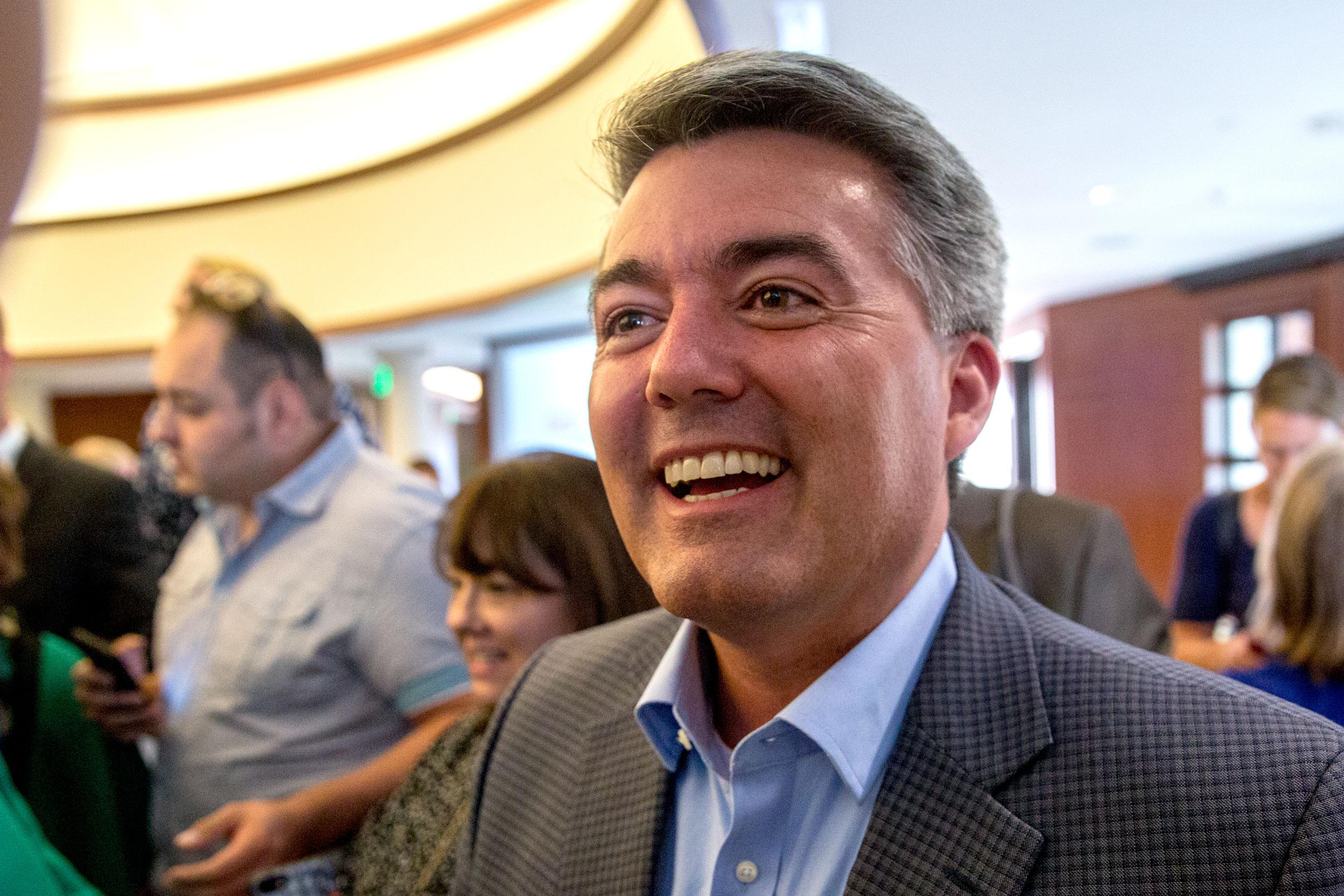
Updated 12:54 p.m.
Some of the biggest players in Colorado's billion dollar legal marijuana industry are gearing up to flex their political muscle in the upcoming 2020 U.S. Senate race. On one side sits Republican incumbent Cory Gardner. Democrats haven't chosen their nominee yet, but all eyes are on former two-term Gov. John Hickenlooper.
If that's the matchup, industry support will likely fall to Gardner.
“Sen. Gardner has stepped up and supported this industry in a big way,” said Andy Williams, co-founder of Medicine Man Technologies, a marijuana products and consulting business.
Williams points to the senator’s push for national banking. He’s also a main sponsor of federal legislation with Democratic Sen. Elizabeth Warren that would let states choose their own marijuana policies without federal interference. And Gardner led efforts to block justice department nominees when former Attorney General Jeff Sessions rescinded the Obama-era Cole memorandum that said the federal government would not get in the way of states that legalized marijuana.
“He went out on a limb for us and I'll do the same for him and I'll do that with any politician, any legislator if they're going to support our industry. And vice versa, if they don't support our industry I'm going to work against them,” Williams said.
Hickenlooper has had a strained political relationship with legal cannabis. When Colorado voters overwhelmingly backed recreational marijuana in 2012, both Gardner and Hickenlooper opposed the initiative. But Hickenlooper has not gone on to champion the industry.
“This industry does not forget when people are good to them,” said Kristi Kelly, executive director of the Marijuana Industry Group. The group has not historically endorsed candidates and she’s not sure if it will this time. She said many people may not be ready to publicly talk about who they might support, because there’s a lot to consider and the election is more than a year away. But she did credit Gardner’s leadership on the STATES Act as instrumental and “a big lift for him, I would imagine.”
While marijuana legalization is a bipartisan issue, Democrats have more widely embraced it. Rick Ridder, a strategist who has worked on marijuana legalization and is a pollster for Democratic Gov. Jared Polis, said he thinks Gardner eventually got on board after realizing the economic and political benefits.
“This was a way to reach out to younger voters that Republicans have not been able to do,” said Ridder, who added that a lot of people may not be aware of Gardner’s role. “The brand of the Republican party has not been particularly good when it comes to marijuana legalization, so Cory Gardner is going to have to swim upstream against the brand as he runs as a, if you will, a pro-cannabis candidate.”
Gardner’s campaign said it’s an issue he definitely plans to highlight and said it’s about protecting states' rights, the industry and “doing what’s right for Colorado.” The senator told CPR he’s proud of his efforts to help legitimize and broaden the policy discussion in Congress and work with businesses.
“I credit the cannabis industry for reaching out to people and educating members of Congress about what it is and what it is not, and how we need a policy framework to allow it to be safe as well as succeed and flourish,” the Yuma Republican said.

Hickenlooper has also changed his opinion on the issue. He was initially a vocal opponent concerned about increased youth use and the negative impact on brain development. He later said his “worst fears” about a spike in teen use didn’t pan out and he eventually offered tacit approval for how Colorado handled marijuana. During Hickenlooper’s short bid for the White House, he said states should be left to decide their own policies and highlighted marijuana legalization in the first presidential debate.
“I'm a small business owner who brought that same scrappy spirit to make Colorado one of the most progressive States in America,” Hickenlooper said in his closing remarks in June. “We expanded reproductive health to reduce teenage abortion by 64 percent and we're the first state to legalize marijuana and we transformed our justice system in the process.”
Yet for many who work closely with the industry his change of heart doesn’t erase the past.
“My jaw kind of dropped when I saw him really taking credit for legalization in the state of Colorado when he was opposed to it to begin with,” said Democratic state Rep. Jonathan Singer, who has helped pass marijuana legislation at the Colorado capitol. “And so, I'll give him credit where credit's due. He could have presented bigger barriers against the industry. But he was not the industry cheerleader that he certainly presented himself to be in front of the American people.”
In his final year as governor, Hickenlooper vetoed Singer’s bipartisan bill to set up marijuana tasting rooms. He also vetoed other widely backed measures to add autism to the list of conditions allowed for medical marijuana and to let publicly traded companies invest in the state’s industry. It was that final veto that businesses said was a major financial setback and hurt their access to capital and growth. One person called it “the straw that broke the camel’s back.”
Hickenlooper’s successor, Gov. Jared Polis, signed all three measures during his first year in office.
Singer said he is glad Hickenlooper is open to a broader conversation on marijuana policy and said he wouldn’t hold his previous views against him at the ballot box.
“I think we have a very fair but robust industry,” Singer said. “You have to share credit on that. And he's part of that. He could have been better. He could have really been on the forefront of things, but he did a good job of getting everyone together in a room and really hammering out some very tough conversations.”
Hickenlooper said he was proud that his administration set a standard for the implementation of marijuana legalization, especially now that other states are following Colorado's example.
“The federal government should decriminalize marijuana, but until that happens, I support the STATES Act because we’ve shown in Colorado that states have the ability to thoughtfully regulate marijuana, and other states should have the ability to do so too,” Hickenlooper said.









